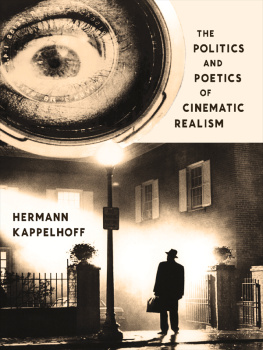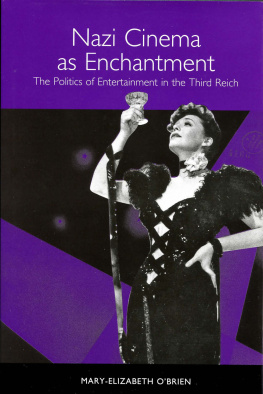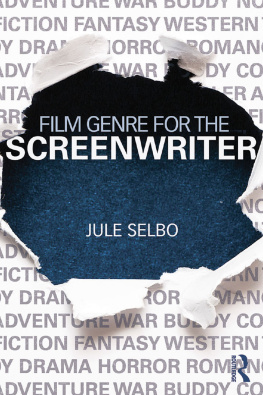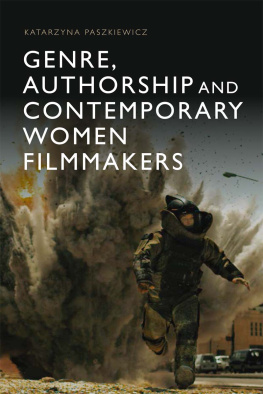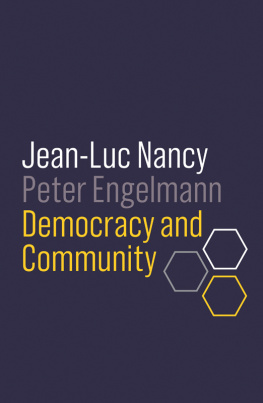Contents
Guide

Hermann Kappelhoff
Front Lines of Community
Cinepoetics

Edited by
Hermann Kappelhoff and Michael Wedel
Volume 1
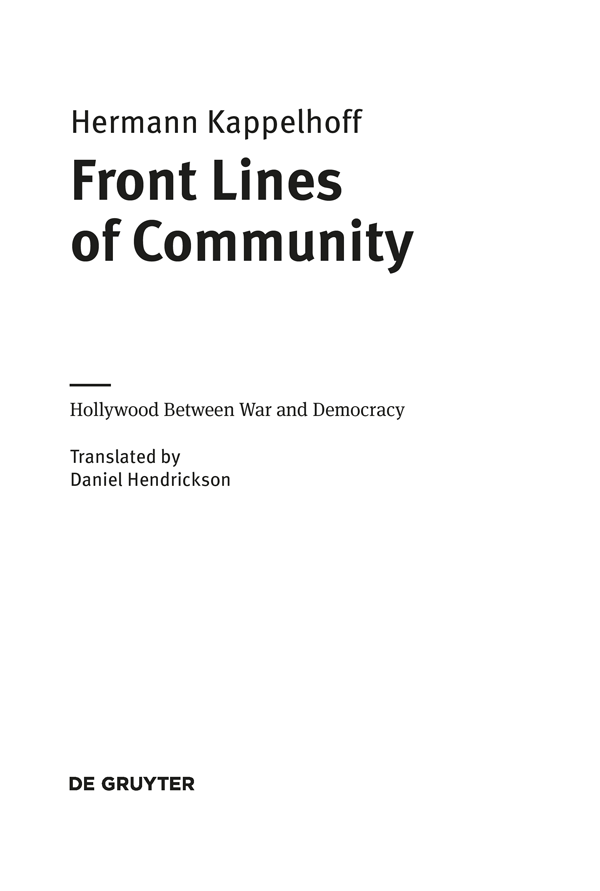
ISBN 978-3-11-046523-5
e-ISBN (PDF) 978-3-11-046808-3
e-ISBN (EPUB) 978-3-11-046733-8
ISSN 2569-4294
Library of Congress Control Number: 2018934555
Bibliographic information published by the Deutsche Nationalbibliothek
The Deutsche Nationalbibliothek lists this publication in the Deutsche Nationalbibliografie; detailed bibliographic data are available on the Internet at http://dnb.dnb.de.
2018 Walter de Gruyter GmbH, Berlin/Boston
Cover image: Shell shocked soldier awaiting transportation away from the frontline.
Don McCullin / Contact Press Images / Agentur Focus
www.degruyter.com
Preface
The Limits of Community : This is the title of a famous book written by the philosopher Helmuth Plessner during the twenties of the last century. The book deals with the opposition between democratic societies, based on the difference of opinion, and those forms of government that claim a communal we, divested of all dissent. His plea for the calming procedures of the institutionalized processes of democratic forms of government and against the mobilization of nationalist or communist feelings of community was historically confirmed to such a harrowing degree that for a long time the idea of political community seemed to have been completely discredited.
Only toward the end of the last century did the term community surface again, starting from debates in French philosophy, a phenomenon that has held to this day. Although I will not explicitly be thematizing this debate (Jean-Luc Nancy, Jacques Rancire, etc.) here, it does form a frame of reference for the fundamental arguments and perspectives that are developed over the course of this book.
I will, however, explicitly refer to a writer who might initially seem out of context in any discussion within continental European philosophy centered around an understanding of politics and community. In fact, it was a book by an American philosopher that urgently showed me how much the understanding of democracy in American liberalism is marked by an idea of the political that is at core an idea of political community. The electoral success of Donald Trump in 2016 has brought this book an attention that is as belated as it is overwhelming. It is a lecture by Richard Rorty, published in 1998 under the title: Achieving our Country . Rorty calls for a return to the liberal idea of American history as a history of a permanent struggle to improve our country. In his view, its driving force should neither be sought in general principles of human justice nor in the evolutionism of the free competition of economic, political, or social forces. Rather, the talk of our country always already requires deciding for solidarity with a we of the political community. The question then, of who can participate in this we socially, politically, culturally, economically who belongs and who does not, is the driving force behind the permanent struggle over the boundaries of community.
Like Helmuth Plessner but now portending the opposite Rorty speaks of an affective bond to the community, a fundamental feeling for the sense of commonality, which, much like the familial bond, is the actual incitement for Achieving our Country. And he chooses which is also what makes it a central reference point for this book films about platoons, the smallest military unit, as an example to understand how American society seeks to come to an understanding about the sense of commonality.
For me, Rortys understanding of the sense of commonality was a final building block with which in turn my reading of the Hollywood war film could be worked out. Indeed, my extensive studies on the Hollywood war film through all its historical and aesthetic changes in media always came to the same conclusion: The fundamental social conflict around which the films were crystallized as a genre of Hollywood cinema consists in the irresolvable contradictions inherent to the sense of commonality itself. The we implicit in our country presents itself on the one hand quite literally as an embattled front line, the course of which is as arbitrary as it is unstable; on the other hand, it collapses inward into mutually exclusive claims by competing communities, whose frontline positions are no less warlike than those of transnational conflicts. Among the internal frontline positions, perhaps the most radical is the one between military communitization and the democratic community. At any rate, in my view, war films open up a historical perspective in which the permanent battle over the boundaries of community can be reconstructed as an inner conflict within liberal democracy.
To reach such a goal I am relying on another great representative of American liberalism, namely Stanley Cavell. In particular, I am thinking of his writings about the comedies of remarriage. As is well known, Cavell reads these films as reflections that probe into the conditions under which democratic relations of mutual recognition are possible. And perhaps, with the platoon films as Rorty calls them Hollywood has developed a cinematic metaphor that achieves, with regard to the front lines of political communities, what the metaphor of the twice married couple contributes to the paradigm of civil democratic agreement.
The present book therefore deals with the idea of American democracy but not as an objectively historical object in the history of ideas or of politics, but as an approach to a sense of commonality, as it might confront spectators today in the Hollywood war films of an earlier time period. To me at least, the reconstruction of such a sense of commonality in film analysis seems to opens up historical consciousness in the first place, which the films of Frank Capra, John Ford, William Wyler, or Sam Fuller and many others bring into our present day.
The films are a cultural legacy, artifacts of a critical state of emergency. They attest to a struggle over the political self-conception of a nation, one that reflects on its beginnings during the state of emergency of war in order to found itself anew, over and over again. This can be understood quite literally. Indeed, self-reflection I am borrowing here from a highly idiosyncratic interpreter of American liberalism, namely Hannah Arendt on self-defined beginnings is the basic form of political action. It refers to acting into an undefined future, by which a political tradition is grounded, without itself being able to rest on any foundation. For this action setting a beginning, modernity developed the idea of revolution. If we follow Hannah Arendts analysis in On Revolution , the American Revolution can in turn be distinguished from all those that followed it by how this action was carried out. The revolutionary upheaval was not primarily determined by conquering state power in war or civil war. It was carried out much more as a declaration of the claim to freedom by its citizens in order to regulate the possibility of state force. The revolution was carried out as a promise with which the power concentrated in state institutions was bound to a single goal: the pursuit of individuals to secure their happiness.
The circumstance that the state would not be allowed any interests in its own right, which could be defended in world politics, might all too easily seem to be isolationism in advance of the two world wars. Obviously, the American population had to give up something that citizens of other states would not even have been conceded. Namely a sense of commonality that allows the state as such no life of its own, which could least offset the everyday lives of its citizens. At any rate, that is the view of things conveyed through Hollywood war films; they make very palpable how state force ends up in the sharpest contradiction to liberal democracy, when military mobilization encompasses a society in its totality.


